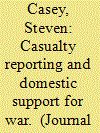| Srl | Item |
| 1 |
ID:
095273


|
|
|
|
|
| Publication |
2010.
|
| Summary/Abstract |
The common argument that public support for war is casualty sensitive ignores the fact that casualty figures are not revealed automatically. While the military decides when, and to whom, to release such information, political elites can question, even condemn, how the government goes about this business. After briefly exploring how the US military operated during the two world wars, this article focuses on American casualty reporting during the Korean War, arguing that the way the figures were revealed often sparked enormous political controversy, which at two crucial moments helped to undermine domestic support for this distant war.
|
|
|
|
|
|
|
|
|
|
|
|
|
|
|
|
| 2 |
ID:
142697


|
|
|
|
|
| Summary/Abstract |
The scholar Edward Corwin famously described the separation of powers between the executive and the legislative branches set out in the U.S. Constitution as “an invitation to struggle for the privilege of directing American foreign policy.” With different parties controlling different branches of government, partisan politics tends to intensify this struggle, and the consequences can be ugly. These days, for example, hardly a week seems to go by without vicious sniping between the Obama administration and Republicans in Congress over one issue or another—from China to Russia, Iran to Syria, Cuba to Israel. And on most issues, process as well as discourse has broken down, with each side openly trying to thwart or bypass the other.
|
|
|
|
|
|
|
|
|
|
|
|
|
|
|
|
| 3 |
ID:
100731


|
|
|
|
|
| Publication |
2010.
|
| Summary/Abstract |
Wilfred A. Burchett was perhaps the most controversial foreign correspondent of the Cold War era. An Australian by birth, he wrote for British and French newspapers, but spent much of his career reporting from the other side of the "bamboo curtain." Although his dispatches often had a propagandist purpose, his account of the U.S. Army's media relations during the protracted Korean armistice negotiations continues to exert a significant influence over the academic literature. This article looks at the reasons for this influence and critically examines Burchett's claim that the U.S. military engaged in a concerted effort to mislead the public by lying about, and sometimes suppressing, what was really happening in the truce talks.
|
|
|
|
|
|
|
|
|
|
|
|
|
|
|
|